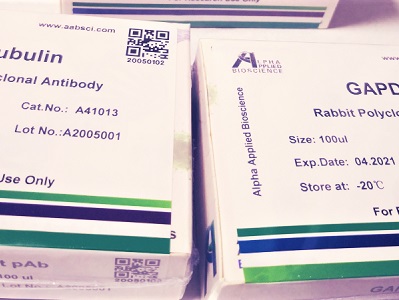

CD314 rabbit pAb
Cat :A12010
-
Source
Rabbit
-
Applications
IHC,ELISA
-
Reactivity
Human
-
Dilution
IHC 1:50-200, ELISA 1:10000-20000
-
Storage
-20°C/1 year
-
Specificity
The antibody detects endogenous CD314
-
Source/Purification
The antibody was affinity-purified from rabbit antiserum by affinity-chromatography using epitope-specific immunogen.
-
Immunogen
Synthetic peptide from human protein at AA range: 167-216
-
Uniprot No
P26718
-
Alternative names
NKG2-D type II integral membrane protein (Killer cell lectin-like receptor subfamily K member 1) (NK cell receptor D) (NKG2-D-activating NK receptor) (CD antigen CD314)
-
Form
Liquid in PBS containing 50% glycerol, 0.5% BSA and 0.02% sodium azide.
-
Clonality
Polyclonal
-
Isotype
IgG
-
Background
killer cell lectin like receptor K1(KLRK1) Homo sapiens Natural killer (NK) cells are lymphocytes that can mediate lysis of certain tumor cells and virus-infected cells without previous activation. They can also regulate specific humoral and cell-mediated immunity. NK cells preferentially express several calcium-dependent (C-type) lectins, which have been implicated in the regulation of NK cell function. The NKG2 gene family is located within the NK complex, a region that contains several C-type lectin genes preferentially expressed in NK cells. This gene encodes a member of the NKG2 family. The encoded transmembrane protein is characterized by a type II membrane orientation (has an extracellular C terminus) and the presence of a C-type lectin domain. It binds to a diverse family of ligands that include MHC class I chain-related A and B proteins and UL-16 binding proteins, where ligand-receptor interactions can result in the activation of
-
Other
KLRK1 D12S2489E NKG2D, NKG2-D type II integral membrane protein (Killer cell lectin-like receptor subfamily K member 1) (NK cell receptor D) (NKG2-D-activating NK receptor) (CD antigen CD314)
-
Concentration
1 mg/ml
| Product | Reactivity | Applications | Conjugation | Catalog | Images |
|---|
-
 400-836-3211
400-836-3211
-
 support@aabsci.com
support@aabsci.com
-
β-actin rabbit pAb ...... >
-
β-actin rabbit pAb(A284) ...... >
-
Plant-actin rabbit pAb ...... >
-
β-tubulin mouse mAb(M7) ...... >
-
GAPDH mouse mAb(2B8) ...... >
-
GAPDH mouse mAb(PT0325) ...... >
-
Histone H3 rabbit pAb ...... >
-
Histone H3 rabbit pAb ...... >
-
COX IV mouse mAb(6C8) ...... >
-
GFP-Tag mouse mAb(1G6) ...... >
-
HA-Tag mouse mAb(1B10) ...... >
-
mCherry-Tag mouse mAb(6B3) ...... >










 400-836-3211
400-836-3211
